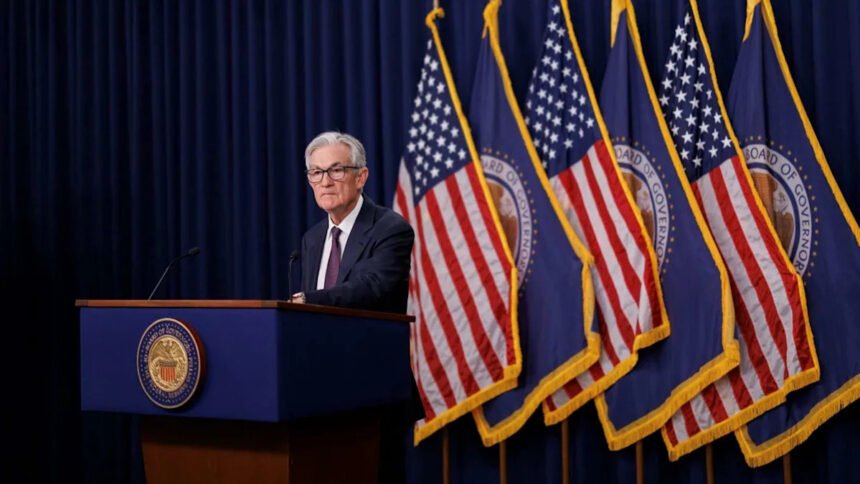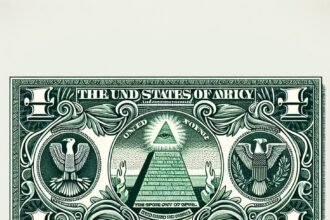As the United States grapples with mounting fiscal pressures and an increasingly precarious debt trajectory, President Donald Trump’s systematic assault on Federal Reserve independence represents a new and potentially catastrophic threat to the dollar’s already fragile position as the global reserve currency.
Trump’s escalating campaign against Fed Chair Jerome Powell—featuring public humiliation, explicit policy demands, manufactured legal controversies and the unprecedented threat of naming a “shadow chair” several months before Powell’s term expires—follows a familiar authoritarian script previously seen in countries like Turkey and Hungary. But the stakes are exponentially higher now that the target is not the central bank overseeing monetary policy for the Turkish lira or Hungarian forint, but the institution whose credibility forms the bedrock of global monetary stability.
For international policymakers already contemplating a post-dollar world amid Washington’s deteriorating fiscal outlook, Trump’s campaign to bring the Fed to heel accelerates an urgent question: How long can the international community rely on a reserve currency whose central bank faces systematic political interference? The dollar’s recent weakness offers an early glimpse of how quickly confidence can erode when markets begin pricing political risk into what was once considered the world’s safest monetary authority.
Historical Precedent
To get more in-depth news and expert analysis on global affairs from WPR, sign up for our free Daily Review newsletter.
Trump’s systematic campaign against Federal Reserve independence follows a well-established authoritarian and populist playbook for undermining central bank credibility. Recent examples from Argentina, Turkey and Hungary demonstrate how political interference in monetary policy creates cascading economic crises. But what makes Trump’s assault fundamentally different is that it targets the world’s reserve currency rather than those of peripheral economies.
Argentina provides perhaps the most instructive example of how political interference creates self-reinforcing cycles of instability. The country’s central bank has been systematically compromised since the 1940s, when then-President Juan Peron first subordinated monetary policy to fiscal needs. Subsequent governments across the political spectrum continued this pattern for decades, pressuring the central bank to finance deficits through money printing.
The mechanics of the political capture of Argentina’s central bank reveal how such interference operates in practice. Presidents routinely replaced central bank governors who resisted deficit financing, creating a revolving door of compliant appointees. The bank’s charter was repeatedly modified to expand government access to reserves, while legal protections of its independence were systematically weakened through legislation and executive decree.
The consequences have been catastrophic and persistent. Since 1945, Argentina has experienced recurring episodes of hyperinflation. The peso has also been devalued repeatedly, losing virtually all of its purchasing power over the decades since then. Most tellingly, Argentina has defaulted on its sovereign debt three times since 2001, largely due to the government’s inability to credibly commit to fiscal discipline when monetary policy remained subordinated to political goals.
Any indication that Fed policy decisions are being influenced by political considerations rather than economic data would represent a fundamental breach of the institutional firewall that has protected the dollar’s credibility for decades.
Another recent example is Turkey, where President Recep Tayyip Erdogan conducted a relentless campaign against high interest rates from 2019 to 2023, rooted in his belief that higher rates cause inflation rather than cure it. In the process, Erdogan systematically destroyed central bank credibility. Between 2019 and 2021, he fired multiple central bank governors who resisted his demands for rate cuts, replacing them with loyalists willing to implement his unconventional theories. The result was a currency crisis that saw the lira lose over 80 percent of its value between 2021 and 2022, while inflation soared above 80 percent.
Hungary under Prime Minister Viktor Orban demonstrates how authoritarians can compromise central bank independence while maintaining the legal facades protecting it. Orban first weakened the Magyar Nemzeti Bank through legislation that expanded government influence over appointments and policy. He then installed loyalists and close allies in key positions, including as governor. The European Central Bank has registered its concerns on multiple occasions that Hungary’s central bank lacks the necessary independence it requires to freely execute monetary policy.
The economic costs of Orban’s assault on central bank independence have been substantial. The forint has lost 52 percent of its value against the euro over the past two decades. Credit rating agencies uniformly rate Hungarian debt just barely above “junk status,” often citing concerns about central bank independence for the low ratings and negative outlook.
What makes Trump’s campaign fundamentally different and far more dangerous than these examples is that this authoritarian playbook has never before been applied to the world’s reserve currency. When Argentina, Turkey and Hungary compromised their central banks, the damage remained largely contained within their borders and between their regional trading partners. If the U.S. employs the same tactics against the Federal Reserve, it threatens the entire global financial system that depends on dollar stability and Fed credibility for its foundational architecture.
Trump’s Unprecedented Escalation
What distinguishes Trump’s current campaign from normal political commentary on monetary policy is its systematic nature and explicit violation of established norms. Trump has moved far beyond traditional presidential suggestions about interest rate policy to directing personal insults at Powell, calling him “stupid” and “a major loser,” while demanding his resignation.
Also concerning is Trump’s alleged plan to announce Powell’s successor as early as this summer, nearly a year before the Fed chair’s term expires in May 2026. This “shadow chair” strategy represents an unprecedented attempt to undermine a sitting Fed chair’s authority by creating competing voices on monetary policy.
Perhaps most troubling, Trump has established an explicit ideological litmus test for future Fed appointments, stating he will only nominate people who will move to cut rates. This represents a fundamental departure from the tradition of appointing Fed chairs based on technical competence rather than policy preferences.
Legal Framework Under Pressure
The legal foundations of Fed independence theoretically protect against direct political interference by the president. Under the Supreme Court’s 1935 Humphrey’s Executor decision, presidents cannot remove independent agency heads without cause. And in a recent ruling that allowed Trump to proceed with doing so as part of his so-called Department of Government Efficiency, or DOGE, campaign to slash the federal bureaucracy, the court explicitly named the Fed as an agency to which it would still apply Humphrey’s Executor. Unsurprisingly, Powell has embraced this long-established precedent, stating that Fed independence “is a matter of law” and that he would not resign if asked to do so by Trump.
However, Trump’s strategy deliberately circumvents these legal constraints rather than challenging them directly. Unable to fire Powell outright, the administration is attempting to render him ineffective through public humiliation, policy pressure, a contrived controversy over building renovations ostensibly overseen by the Fed chair and the creation of alternative authority centers. This end-run around the legal protections of Fed independence may prove more dangerous than direct confrontation, as it avoids clear constitutional violations while achieving similar results. Moreover, the volume and sustained nature of these attacks tests whether legal protections can preserve institutional independence against determined political pressure.
International Implications and Spillover Effects
The global stakes of Trump’s Fed campaign cannot be overstated. An assault on Fed independence is an existential threat to the foundational architecture of the international monetary system. The dollar’s role as the global reserve currency means that Fed credibility underpins international monetary stability. When markets question the Fed’s independence, they question the reliability of the entire dollar-based financial system.
Central banks worldwide currently hold approximately $9 trillion in dollar reserves, making them vulnerable to any erosion in dollar credibility. Countries that have built their monetary policies around dollar stability now face the prospect of increased volatility and uncertainty, but with no comparable alternatives to absorb the scale of global reserves and trade flows.
The timing is particularly concerning given existing strains on the international monetary system. With U.S. fiscal sustainability already under question and alternative currency systems rapidly developing, any additional blow to dollar credibility could accelerate the transition away from dollar dominance. This is precisely what Washington’s strategic competitors hope to achieve: a weakening of the dollar’s privileged position that has underwritten U.S. global influence for decades.
Trade finance, which relies heavily on dollar-denominated instruments, would face particular stress were the independence of the Fed to be in doubt. International businesses and banks that have structured operations around predictable Fed policy could find themselves exposed to unprecedented risks in a system where political considerations override monetary expertise.
Warning Signs and Tipping Points
Several indicators suggest that Trump’s pressure campaign is already affecting the credibility of the Fed’s monetary policy. Credit default swap spreads on U.S. sovereign debt have risen to levels typically associated with BBB-rated countries—those barely rated above junk grade—revealing market skepticism about long-term stability.
Currency markets show increasing volatility around Fed communications, suggesting traders are pricing in political rather than economic factors. The dollar’s weakness following reports of the shadow chair strategy demonstrates how quickly confidence can shift on threats alone. With the dollar already off to its worst start to the year since 1973, the global financial architecture and economy could well veer into uncharted waters if Trump’s threats begin to materialize into action.
Among the key developments international policymakers should be monitoring are any actual announcement of a Fed successor ahead of schedule, further escalation in Trump’s personal attacks on Powell and signs that Fed officials are moderating their positions in response to political pressure. The threshold for serious concern would be crossed if markets begin pricing sustained political interference into long-term dollar assets, or if central banks accelerate their reserve diversification away from dollars in response to concerns over Fed independence.
Most critically, any indication that Fed policy decisions are being influenced by political considerations rather than economic data would represent a fundamental breach of the institutional firewall that has protected the dollar’s credibility for decades. That Trump just fired the commissioner of the Bureau of Labor Statistics because of a poor jobs data report last week already undermines the credibility of the economic data on which the Fed will be basing its policy decisions moving forward. But that would be dramatically worsened if the Fed were to become—or even be seen as—a political instrument under the president’s control. Should that happen, the erosion of confidence could become self-reinforcing, with markets questioning not just current policy but the entire framework of Fed independence that underpins the dollar’s global role.
Implications for Global Financial Stability
The international community faces an unprecedented dilemma: The world’s most important central bank is under systematic political assault by the very government that benefits most from the dollar’s global dominance.
Trump’s campaign against Fed independence could trigger a cascade of global consequences, unprecedented in modern financial history. The authoritarian playbook he is using is the same one we’ve seen in peripheral economies, but the stakes are exponentially higher when applied to the institution that undergirds the entire international monetary system.
As a result, central banks around the world should accelerate their reserve diversification efforts and stress-test for scenarios involving compromised Fed independence. Financial institutions with significant dollar exposure should develop contingency plans for increased volatility. International payment systems should prioritize the development of alternatives to dollar-based settlement—not as an ideological choice, but as a practical necessity for financial stability.
The current standoff between Trump and Powell may be resolved without permanent damage if institutional guardrails hold. But the precedent of sustained political pressure on Fed independence has been established. Should Trump’s tactics work in influencing Fed policy, and even if they do not, future presidents may feel emboldened to push even further.
The world’s reliance on dollar stability has created systemic risks that extend far beyond U.S. borders. Trump’s campaign against Fed independence serves as an urgent reminder that political dysfunction in the hegemon threatens global financial stability in ways that no previous central bank crisis ever could.
Nicholas Creel is an associate professor of business law and ethics at Georgia College & State University.
The post Trump’s Assault on the Fed Could Sink the Global Financial System appeared first on World Politics Review.




















